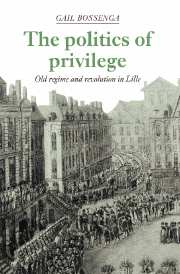Book contents
- Frontmatter
- Contents
- List of figure and tables
- Preface
- List of abbreviations
- 1 Monarchy, privilege and revolution: the problem and setting
- 2 State finance and local privileges
- 3 Corps, bureaucracy and citizenship: the case of the Bureaux des Finances
- 4 The excluded nobility and political representation
- 5 A nation of equals: the demands of the Third Estate
- 6 Uses of a regulated economy: the state against itself
- 7 Corporate privilege and the bourgeoisie
- 8 The abolition of the guilds
- 9 The corporate heritage and the well-ordered state
- 10 Conclusion
- Notes
- Bibliography
- Index
10 - Conclusion
Published online by Cambridge University Press: 01 October 2009
- Frontmatter
- Contents
- List of figure and tables
- Preface
- List of abbreviations
- 1 Monarchy, privilege and revolution: the problem and setting
- 2 State finance and local privileges
- 3 Corps, bureaucracy and citizenship: the case of the Bureaux des Finances
- 4 The excluded nobility and political representation
- 5 A nation of equals: the demands of the Third Estate
- 6 Uses of a regulated economy: the state against itself
- 7 Corporate privilege and the bourgeoisie
- 8 The abolition of the guilds
- 9 The corporate heritage and the well-ordered state
- 10 Conclusion
- Notes
- Bibliography
- Index
Summary
In The Coming of the French Revolution, Georges Lefebvre argued that “the Revolution of 1789 restored the harmony between fact and law.” For Lefebvre, fact was to be found in the economy, in modes of production and the social interests arising from them. Law was secondary. It consisted of the whole juridical apparatus and norms that legitimated the control of a dominant social class. Fact fundamentally defined social identity; law merely confirmed it.
This study has argued a different case. Law in the old regime, it claims, was constitutive of social identity. Corporate rights and privileges provided differential access to status, power, and wealth within the elite in such a way as to generate independent interests. Rather than legitimating the rule of a dominant class, the juridical framework of society fragmented the elite in such a way as to make a concerted defense of privilege ultimately impossible. And for this reason, in 1789 it was the legal and institutional basis of society that was overturned, not to allow a new class to establish its hegemony, but to transform the ground rules by which political power, analytically distinct from that generated by class relationships, operated within the state. For the men of the eighteenth century, law was very much fact.
The central issue of the French Revolution was how to create new juridical norms that would make both membership in the state and the exercise of political power accessible, principled, and equitable. The constitutional upheaval of 1789 involved a profound redefinition of public norms, of the legal conditions under which people would submit to political authority and the basic rules by which they would conduct their social activities.
- Type
- Chapter
- Information
- The Politics of PrivilegeOld Regime and Revolution in Lille, pp. 201 - 207Publisher: Cambridge University PressPrint publication year: 1991



